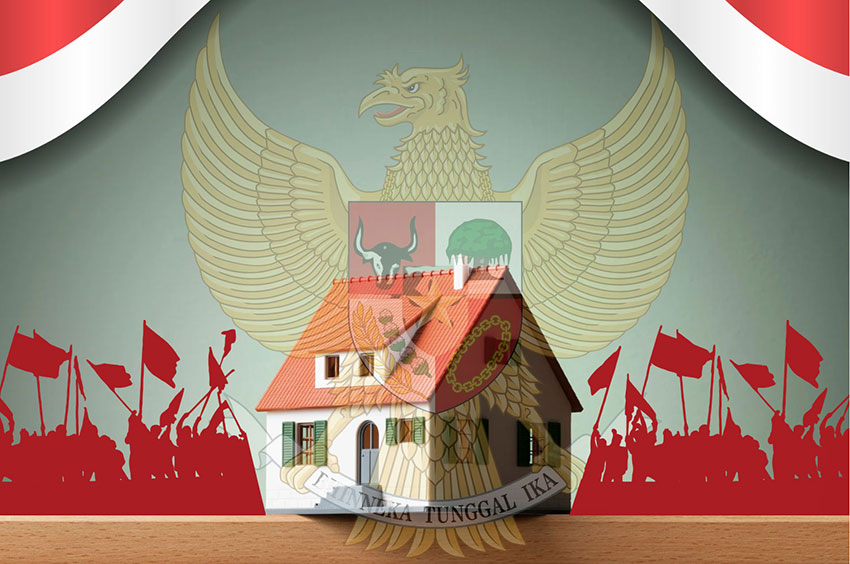Let Us Come Together Again (Part II – Conclusion): The PIP Bill, The Road Home to the House of Pancasila

Let us come together again: united in the House of Pancasila.
This call is a summons of history, a call of the nation’s conscience, which feels ever more urgent amid today’s political, social, and cultural climate.
Where polarization produces wounds – separating brother from brother, friend from friend – as though differences in political views were reason enough to erase the sense of togetherness.
In moments as turbulent as the recent events, the noble echo of Pancasila must be continuously sounded.
For Pancasila is not merely five principles inscribed in the Preamble of the 1945 Constitution.
It is the soul, the very breath that gives life to the nation.
And just like the soul, it can wither if left untended, if reduced only to a slogan without being realized in concrete action.
Unity is not enough when uttered in ceremonial speeches; it must be embedded in just public policies, in political decisions that elevate the nation’s interests above personal gain, and in everyday attitudes that reject all forms of discrimination.
We must understand the House of Pancasila not as an abstract construct, but as a living space that demands the loyalty of all.
If the elites abandon that house, if the people lose trust in its foundation, this national home will crack and collapse.
Amid this situation, Bung Karno’s concept of Trisakti regains its relevance.
Sovereignty in politics, self-reliance in the economy, and cultural identity are the three pillars supporting the House of Pancasila.
Political sovereignty reminds us not to let this nation become hostage to foreign powers or domestic oligarchies.
Self-reliance in the economy affirms that true independence only has meaning when the people can live in prosperity without dependence on an unequal global structure.
Cultural identity teaches us not to lose ourselves in the strong currents of globalization.
Together, these three provide a concrete path to reaffirming Pancasila as our common home—guiding and anchoring us amid the storms of the times.
To keep this house strong, moral appeals alone will not suffice.
We need legal instruments and binding policies that serve as a bridge between ideals and reality.
This is why the Bill on the Development of Pancasila Ideology (RUU PIP) must be urgently enacted into law.
The PIP Bill is not just an ordinary legislative product, but an urgent necessity to ensure that the values of Pancasila live not only in rhetoric, but are rooted in the collective consciousness of the nation.
Without a strong legal foundation, ideological development will remain sporadic, sectoral, and vulnerable to being reduced by temporary interests.
The PIP Bill stresses that nurturing the ideology is not the task of a handful of institutions, but a shared responsibility of all elements of the nation: state institutions, local governments, political parties, civil organizations, the business world, down to grassroots communities.
The cultivation, internalization, institutionalization, and cultural embedding of Pancasila values must be carried out comprehensively and sustainably.
Imagine a nation where every institution, every public policy, every social space breathes with Pancasila values—that is the true meaning of the House of Pancasila.
The PIP Bill is the legal foundation binding us to build this house collectively, not partially.
We must indeed be cautious that ideological development does not slip into rigid indoctrination as in the past.
It must be pursued in a dialogical, participatory, and contextual way.
But such caution must not become hesitation.
We cannot delay, for without a solid legal framework, Pancasila risks becoming an empty political slogan, increasingly losing its unifying force.
Even more so in this digital era, where the public sphere is filled with hoaxes, hate speech, and divisive narratives.
Pancasila needs a legal home to protect it, so it may continue to live as the guiding star of the nation.
Let us come together again: united in the House of Pancasila.
This is the time to realize that the house is not only a symbol, but also a social and legal contract.
We must dare to establish the Pancasila Ideology Development Bill as law, as proof of our commitment that this nation no longer wishes to live fragmented by narrow interests.
Such a law will serve as a pillar ensuring that Pancasila is not merely preached but lived in daily reality.
It will serve as a mirror compelling the elites to set aside their egos, and as a lamp guiding the people so they are not trapped in the darkness of polarization.
We must realize that without this house, we are merely inhabitants of fragile ground, easily tossed by storms of interest.
But with this house, we have shelter, a place to return, a space where all differences can be united in a common ideal: an Indonesia that is just, sovereign, self-reliant, and culturally grounded.
Thus, the call of history today is clear: let us come together again, let us unite in the House of Pancasila.
And to keep that house strong, the Pancasila Ideology Development Bill must immediately become law.
There is no time to delay, for delay means allowing cracks to spread, and letting this nation drift without direction in the increasingly turbulent currents of globalization.
Prof. Dr. Ermaya Suradinata, SH, MH, MS, was Governor of Indonesia’s National Resilience Institute (2001–2005) and Director General of Politics and Social Affairs, Ministry of Home Affairs (1998–2000). He is an Expert Council Member of BPIP (Agency for Pancasila Ideology Education) in the field of Geopolitics and Governance, and Chairman of the Advisory Board of the Center for Geopolitics & Geostrategy Studies Indonesia (CGSI).
